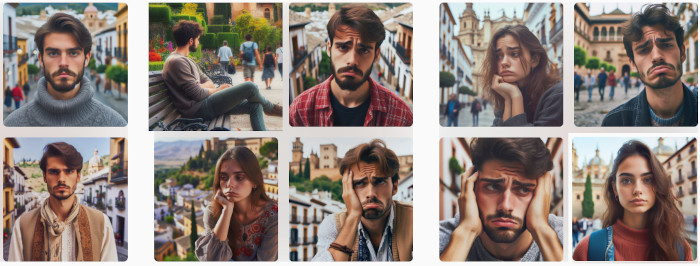
What does malafollá mean in Granada Spain?

Malafollá: Decoding the Grumpy Charm of Granada’s Locals 
I lived in Granada for many years but even on the first day in Granada I noticed that the Granadinos have a certain cantankerousness or dryness that is hard to understand. It is the diametric opposite of Americans saying "Have a nice day!". This untranslateable quality is called "malafollá". Just last week I was at a builders merchant about to place a large order. In any other place the staff would be falling over themselves with fake obsequiousness but here in Granada they treated me as if they were doing me a great favour by selling me stuff and almost pitied me for making the mistake of doing business with them. After many years in Granada I still don't understand this concept but I will attempt to explain it here.
Granada is one of Spain’s most stunning cities — rich in history, nestled between mountains, and famous for its free tapas culture  . Yet despite all this, locals known as granaínos have a reputation for being a bit... prickly.
. Yet despite all this, locals known as granaínos have a reputation for being a bit... prickly.
Contrary to popular belief, malafollá doesn’t mean someone is rude, angry, or uninterested. It’s not about bad manners or a bad mood. Instead, it's more about a certain flavor of dark humor and irony that many Granadinos are known for  .
.
What is malafollá?
While Andalusians are generally known for their warmth and cheerfulness  , people from Granada often come across as sarcastic, blunt, or moody. But this isn’t necessarily a flaw — it’s a regional trait. This attitude, known as malafollá, is deeply embedded in the city’s cultural identity
, people from Granada often come across as sarcastic, blunt, or moody. But this isn’t necessarily a flaw — it’s a regional trait. This attitude, known as malafollá, is deeply embedded in the city’s cultural identity  .
.
You might get a gruff waiter or a snarky bus driver — but that doesn’t mean they’re being rude. To locals, that’s just normal.
Where does the word come from?
From a linguistic standpoint, the word malafollá comes from the Latin root follis, which means to blow air. Over time, though, this quirky term has picked up several colorful origin stories  .
.
Though some might guess it comes from a risqué phrase (like mala follada), the term actually traces back to fuelle — the bellows used by blacksmiths. One of the most popular legends tells of a blacksmith's apprentice in Sacromonte, whose job was to keep the coals hot by blowing with a bellows at the right rhythm. Unfortunately, the young man wasn’t exactly skilled in this craft, and his father would scold him, saying he had “mala follá,” a jab at his poor technique. This nickname stuck — and according to many, that’s how the word was born  .
.
Whether or not this is the true origin is up for debate. Like many expressions that evolve over time, it’s hard to pinpoint exactly where and when it began. Still, this is the most widely accepted version of the story in Granada  .
.
Why so grumpy?
Locals say the environment plays a part. Sweltering summers, freezing winters, and hard land don’t exactly foster sunny attitudes  . As one local farmer put it, "Try walking around here in July. It’s hot enough to make anyone stop talking."
. As one local farmer put it, "Try walking around here in July. It’s hot enough to make anyone stop talking."
Irony over sweetness
According to local writers, malafollá isn’t about hostility. It’s about dry wit, sarcasm, and a touch of pessimism — a way of coping with life by laughing at it  . Just like Cádiz is known for humor, Granada is known for deadpan delivery.
. Just like Cádiz is known for humor, Granada is known for deadpan delivery.
As law professor Nicolás López Calera once said: "Since everything’s going to end badly anyway, we might as well turn it into a joke." 
So if you’re wandering through the winding streets of Granada and get served up a sharp comment with your café  , don’t take it personally. That’s just the malafollá in action.
, don’t take it personally. That’s just the malafollá in action.
2,607 views of this article.
Last Modified on April 23rd, 2025
Created on April 23rd, 2025
2,543,020 Total Views
This article is part of the following categories. Click on the links to see a list of similar articles:
Go to homepage
Below is a list of the most highly rated places to visit in Spain
Click on the links to see the most popular activities that you can do in these places:
Note that the booking system uses a Spanish system and there is no involvement of any American company and no US tariffs.
